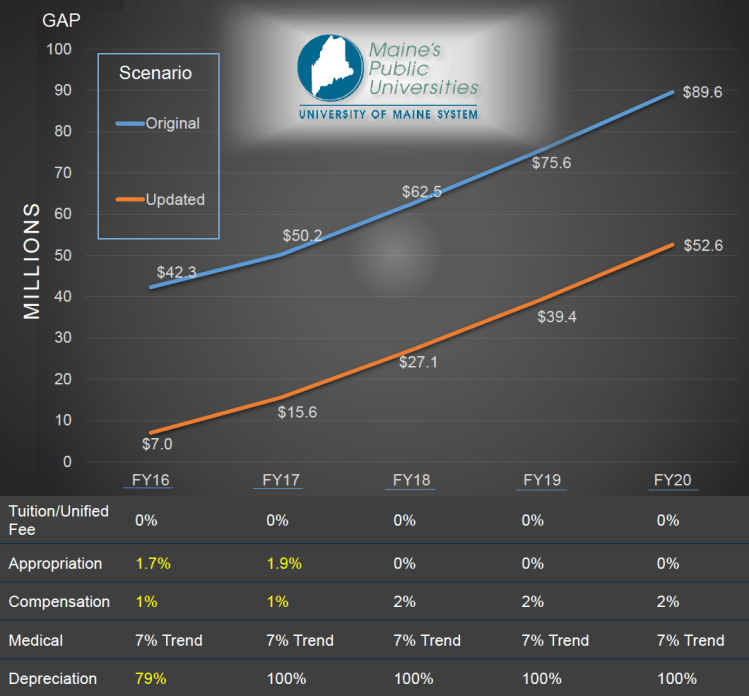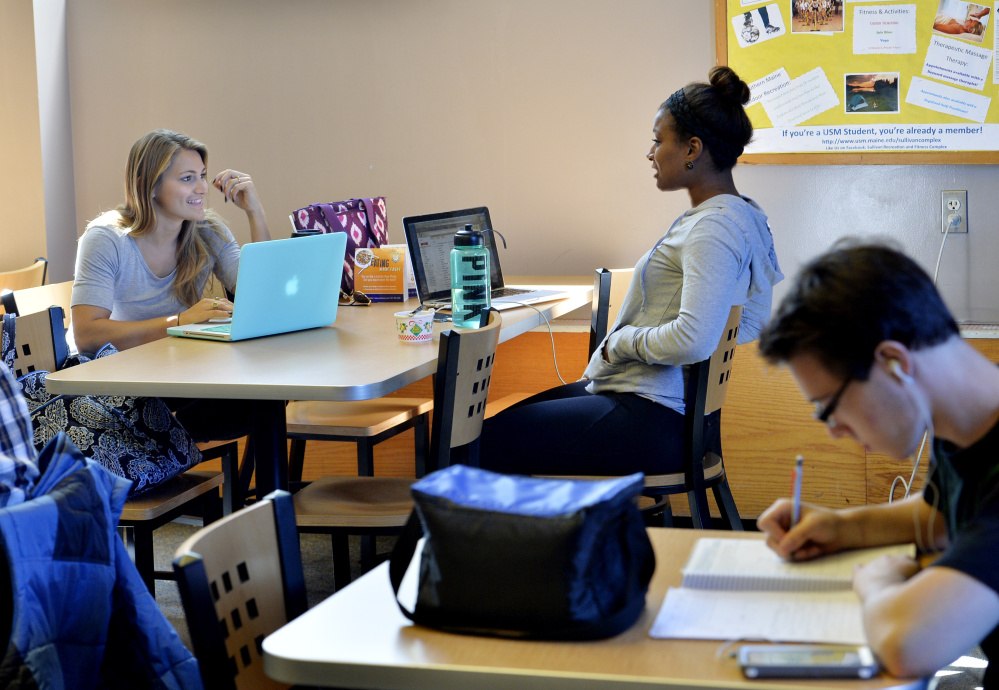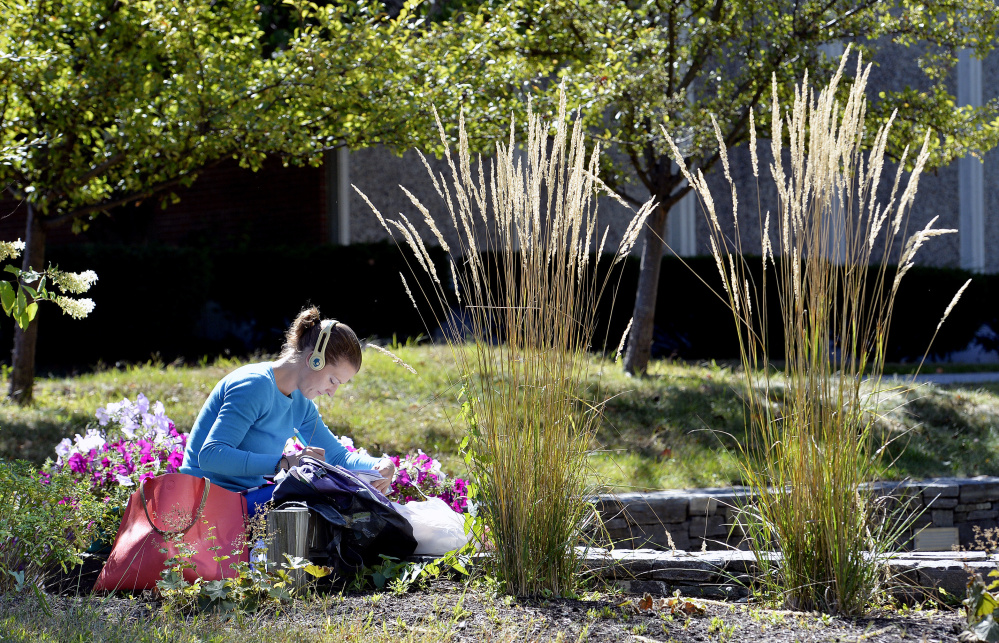PRESQUE ISLE — Years of deep cuts have shaved $37 million off the University of Maine System’s five-year projected deficit, according to updated financial figures presented to the system trustees Monday.
The projected fiscal year 2020 budget gap is now $52.6 million, compared with earlier projections of $89.6 million, according to the presentation by system Chief Financial Officer Ryan Low.
Low said the largest share of the savings, $21 million, came from eliminating positions. Another $6 million came from campus-level budget cuts, and the balance was a mix of increased revenue, such as a boost in state appropriations, a rise in out-of-state students who pay higher tuition, and better-than-expected union contracts.
Low said the five-year projection is a baseline estimate, and does not include any other revenue. Additional five-year projections that could cut the deficit further include:
• If the state appropriation rises each year at the same rate as the Consumer Price Index, or just under 3 percent, the budget gap in 2020 would shrink to $38.6 million.
• If the state appropriation and tuition revenue both increase by the CPI rate, and the system writes off some depreciation, the 2020 gap would drop to $22.4 million.
Since 2010, the system has eliminated 656 full-time-equivalent positions, bringing total staffing from 5,017 employees to 4,361 by June 2015. Since 2012, overall compensation has been reduced nearly $5 million systemwide, from $258.8 million to $253.8 million.
ERASING DEFICIT, THEN REINVESTING
“We had to make difficult choices,” trustee Chairman Sam Collins said about the cuts in recent years. “I hope the Legislature sees the hard work and effort it took to get to where we are today, and that it will take a combination of modest (state appropriation) increases and continued cuts” to erase the projected deficit.
The trustees need to focus on getting the deficit to zero, ideally by 2019, Collins said.
“We still have a major gap,” Collins said. “We need it to go to zero because we need to start reinvesting in signature programs. There’s a lot of hard work being done at each campus.”
The system’s employment peaked in 2007, with 5,414 full-time-equivalent employees. Officials have eliminated more than 700 positions since then.
Chancellor James Page said the report shows “substantial progress,” but that ongoing cost-saving projects need to continue.
“These are hard-won but fragile advancements,” said Page, who did not want to lose sight of the human cost behind the numbers.
“This is good news and these are dry numbers, but we should not forget the reduction was built on eliminating literally hundreds of full-time-equivalent employees who were doing good work and were the victims of this, not the cause,” he said.
The shrinking deficit is good news, said Connor Scott, the UMaine undergraduate student representative to the board of trustees.
“We made tough choices, and for students it was difficult and it was challenging,” Scott said. “But it was time. It’s very good at the end of the day to be fiscally responsible.”
Also Monday, university officials also announced the creation of the Maine Food and Agriculture Center, a new way for Mainers and Maine businesses to tap into the resources currently offered across all seven campuses. Much of this work is coordinated through University Extension offices, but the new center is in response to the growing markets in agri-tourism, farming, organic farming and the local food movement.
“It’s very clear that one of the cornerstones of Maine’s economy is going to be agriculture,” Page said.
The center will allow the system’s various agriculture-related efforts to be better coordinated and will improve outreach, he said.
“Food is becoming an economic development issue. It’s very exciting,” said John Rebar, executive director of UMaine’s Cooperative Extension. Rebar noted that the center can help small farmers or major chains – he said Chipotle reached out to him recently to identify farmers within 175 miles of their locations.
EARLY RESULTS OF ACADEMIC REVIEW
The trustees also were updated Monday on the early work of the academic review. Faculty teams are analyzing each academic area, such as nursing and business, and evaluating programs across campuses to see what changes should be made – for example, whether multiple campuses should offer the same degree.
Recommendations include creating joint or system degrees for history, business, criminal justice, education, languages, marine sciences and nursing. Ideas include sharing courses and faculty, such as creating semester-long residencies at various campuses for the recreation and tourism program.
Any final decisions need to be made in consultation with faculty members and administrators, said Ellen Chaffee, who is overseeing the academic review.
Also Monday, the trustees:
• Approved funds that can be used to give raises to employees not covered by union contracts, including senior administration officials. The increase, equivalent to a $750 one-time bonus and a 2 percent raise, creates funds that each campus president can distribute as desired. Page said he will not take a raise, nor will flagship President Sue Hunter, and any raises would be merit-based.
• Approved a $2 million loan to fund moving central office staff from their Bangor offices to various locations, including another Bangor building and the former MPBN building at 65 Texas Ave., which that is now called Lewiston Hall and is a remote location of UMaine-Augusta. The loan will be repaid with the proceeds from the sale of the current central office at 16 Central St. The trustees also approved $1 million in improvements to Lewiston Hall.
• Approved a five-year, $1-a-year lease at the former Brunswick Naval Air Station for a facility to be used by the Maine Cyber Security Cluster, a University of Southern Maine research unit. It would be a sub-tenant of SmarterRisk, LLC, and in a secured space with power that meets federal government specifications for a closed facility that can handle classified research.
• Approved $2.4 million for the Trustee’s Reinvestment Fund, with $2.1 million for academic reinvestment at multiple campuses; $200,000 for the new Food and Agriculture Center; and $100,000 for the academic overhaul.
Send questions/comments to the editors.






Success. Please wait for the page to reload. If the page does not reload within 5 seconds, please refresh the page.
Enter your email and password to access comments.
Hi, to comment on stories you must . This profile is in addition to your subscription and website login.
Already have a commenting profile? .
Invalid username/password.
Please check your email to confirm and complete your registration.
Only subscribers are eligible to post comments. Please subscribe or login first for digital access. Here’s why.
Use the form below to reset your password. When you've submitted your account email, we will send an email with a reset code.